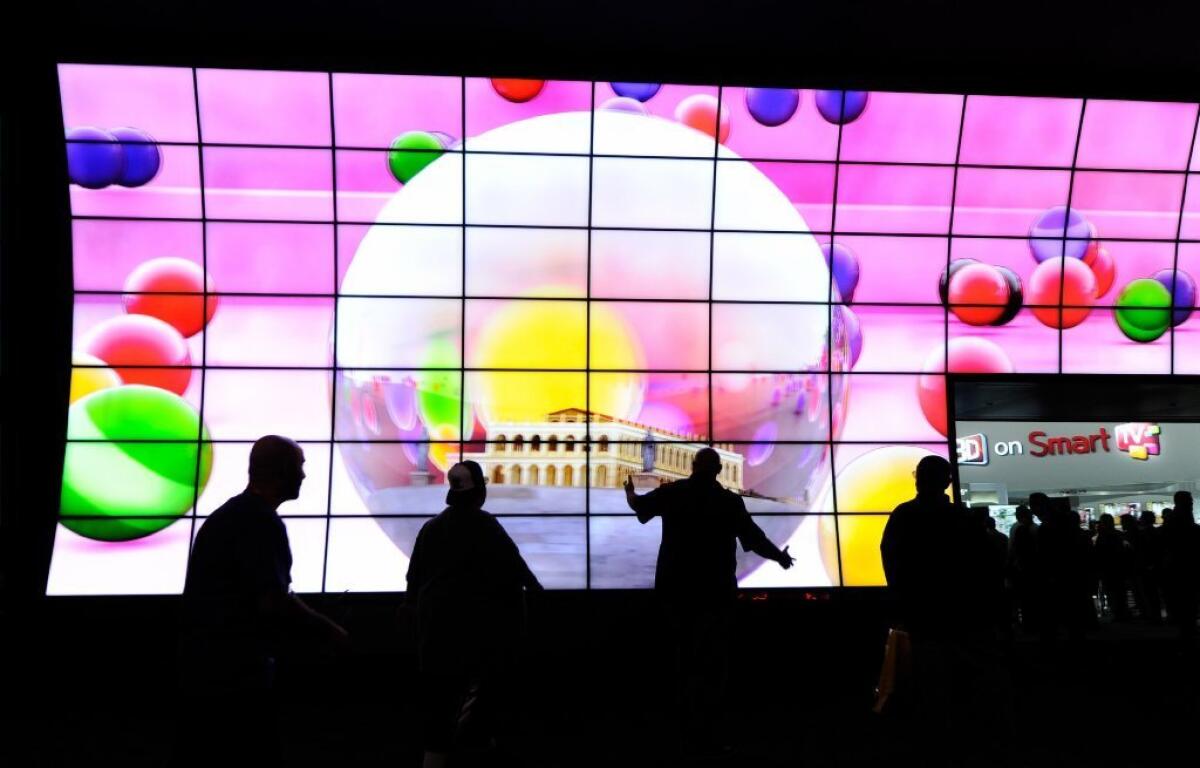All hail our smart TV masters, but not just yet

After many false starts, television is becoming an interactive medium.
In a sense, it’s always been one — even two channels require a choice. Long accustomed to the illusion that the screen is a window through which we are sometimes directly addressed, we are well prepared to be actually watched by it: The TV of the immediate future will be pointing a camera at you. It will know your face. It will see you when you’re watching, and it will tell you what you want to watch. As you may have already experienced with Netflix or Amazon, it will often be on target.
“Finding something to watch used to take forever,” says an actress playing an Average Viewer in a promotional video for Samsung’s new latest-generation smart TV. She is happy that her television is fetching back from the overcrowded ether “the kind of stuff I like.”
A friend of mine wrote recently, “The people I am interacting with today are working on ‘empathic algorithms’ and ‘sentiment predictors.’” (It was a post on Facebook, it seems worth noting.) The new smart TVs, like the smartphones and tablets that have shaped them, are meant to seem like devoted servants, concerned with our welfare, eager to anticipate our needs — happy to collect and digest information we are, or imagine we are, too busy to collect and digest ourselves. It is all a bit flattering.
Science fiction has taught us that this is what happens just before the human race is overthrown and we are made to serve the servers.
Interactivity is something that the various factions that make up television (manufacturers, content providers, advertisers) have been chasing for a while. It took other inventions and their unpredictable effects on human desire and behavior to make it possible. Smartphones and tablets and the apps and habits they engendered — like “second screen” watching, where you’re online with a mobile device as you watch a TV show — are what set the stage, along with the rise of the Internet as a TV delivery system. All will converge in your new TV — your new “TV experience,” as it’s being called, to distinguish it from plain old television.
PHOTOS: Hollywood Backlot moments
It also required a generation to grow up inside these blurring technologies — people who are happy telling the world who they are, where they are, what they’re eating, what they’re watching, what they’re playing, what products they use or wish they could afford. They are a marketer’s dream come true. To older generations they may seem to possess an imperfect, even an incoherent idea of privacy.
But their lives — and so, increasingly, everyone’s — are steeped in “sharing,” as encouraged by the social media upon which television is already riding piggyback. And the more we share, the more the machines take our measure: Welcome to the Recommendation Engine Economy.
I don’t worry about this much. I’m aware that I’m just a drop in a vast digital sea and that my identity, as I perceive it anyway, is useful only as a term in an equation. There is no prurient interest in algorithms, no electronic self-consciousness muttering to itself in some server, “Look what Robert has been up to.” (Not yet.) Practically speaking, despite all the Internet knows about me, I am anonymous.
But that doesn’t mean I’m ready to play along, either. I habitually tell the Internet less than the Internet wants to know; sometimes I lie to it. This is partly mere cussedness but also because I resent the intrusion and the (sometimes insulting) accuracy of the ads that are pushed my way.
PHOTOS: Tech we want to see in 2013
That people are lazy guardians of their data is fundamental to the business of the commercial Internet, with its “terms of use” agreements most everyone agrees to without ever reading. Few of us bother to clear caches or kill cookies, because, what’s a cookie? Most of us, though we know we are being tracked, are no more liable to think about it than we are about the complicated backgrounds and moral ramifications of the things we buy and eat and invest in.
Still, it’s this willingness to accept the convenient default setting, to cede decisions to others — and not even to other humans — that is the first step to our enslavement by the robot overlords. Though these new gadgets promise us newfound freedom, we are always being driven toward a desired outcome, as when asked to choose a forced card in a magic trick.
This mostly has to do with watching ads and buying stuff. The home-entertainment industrial complex wants to create within you a state mixed of excitement and lassitude, an addictive experience that creates a sort of inertia that keeps you in your seat, watching, clicking, dreaming. (“The Matrix” is barely a metaphor.) And of course, shopping: In the coming world of “t-commerce” (“t” for “tele-”), there will be no distance between the advertisement and the purchase. See. Click. Own.
ON LOCATION: Where the cameras roll
What else would you expect? Television is not dedicated to social welfare or spiritual ennoblement, though it will happily trade on your desire for either. (Obviously there are people who make TV who care about those things, but they are only people.) If anything, it capitalizes on dissatisfaction and dis-ease, both as a form of self-medication and by delivering eyes to advertisers who promise happiness in the shape of a drug, a car, a cosmetic, a soft drink.
The double promise of intelligent television is that you will always have something to watch that suits you. It seems fair to ask: Is that necessarily a good thing?
I have not come to argue with Tomorrow: Happy in their full-service media cocoons, the people of the future may look back on my resistance as not only useless but also foolish. Still, in the end, it might not be a bad thing to now and again feel that there is nothing to watch on TV, whatever your television set might say to the contrary. You might even turn the thing off. You might read a book, or bake a pie, or fix the pipes, or walk outside into the light and air. Your recommended programs will be waiting when you return.
More to Read
The complete guide to home viewing
Get Screen Gab for everything about the TV shows and streaming movies everyone’s talking about.
You may occasionally receive promotional content from the Los Angeles Times.







